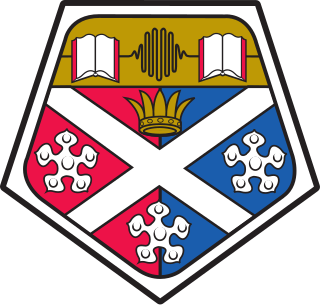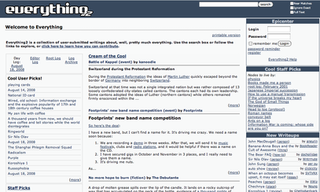Strathclyde Personal Interactive Development and Educational Resource (SPIDER) is a virtual learning environment used by the University of Strathclyde to provide an online platform for class material, support and more. [1]
Strathclyde Personal Interactive Development and Educational Resource (SPIDER) is a virtual learning environment used by the University of Strathclyde to provide an online platform for class material, support and more. [1]
SPIDER began in 1998 as a web project to convert a single course module into an interactive web environment. Originally in 1998 SPIDER was a "static" website and was coded in HTML. This type of coding became a flaw to development as hand scripting HTML became very time consuming.
The development of SPIDER is documented from its creation in 1998. The following bullet points give the main development from previous versions. [2]
The SPIDER system is organised into clusters. Each cluster represents an academic degree or a series of related academic degrees, which allows administration and management of classes and content to be handled by different departments. For example, all pharmacy related content is in the pharmacy cluster, chemistry content in the chemistry cluster and so on, with each cluster having its own administrator, sub-administrators and editors in charge of management and control of their own classes and materials.
The availability of clusters is one of SPIDER's unique features. It allows for much finer control and better organisation of content than typical VLEs which have a very flat structure, a single layer of classes controlled by tutors. There may be hundreds or even thousands of these classes, but there is no unit or department structure to allow for sensible grouping of classes and their control.
SPIDER's cluster system provides an extra level of hierarchy that allows for devolved administration by allocating each class to a department within a cluster. Administrators within the cluster then have complete control of their own classes and content, but have no control over those in other clusters. At the same time student users are able to view classes and content across cluster boundaries.
As a result of this cluster being available, many of SPIDER's tools have the flexibility to operate at both the class and academic degree/ programme/ unit level. For example, staff users on SPIDER are able to target news items at several classes in their cluster or even at year level. This news will only be seen by students in the matching cluster - so if a Pharmacy lecturer were to post news for year 1 pharmacy students, this won't be seen by chemistry or physics students. However, if the target is a class code (e.g. a mathematics class taken by chemists and pharmacists) the news will be seen by anyone in any cluster who has the code set in their news filter.
In addition the user object exists within a cluster, allowing suitably authorised users to view all the data corresponding to a user in their cluster. This would allow a year co-ordinator to see all a student's results across all their classes without having to own or be a tutor in every single class that the student is taking [3]
SPIDER makes use of an academic session to establish which content is current and which is archived. Class lists, group membership, class content, exam & quiz results and many other tools are 'session aware' so that the user is presented with the active data or can choose to view archived data. The session preserves the data in these tools as it was at the time the activity took place. This enables students who are viewing their previous classes for revision or resitting classes to see exactly the content and activities that were available at the time they took the class. Similarly staff can view session by session archives of the class as it was in previous sessions.
A web portal is a specially designed website that brings information from diverse sources, like emails, online forums and search engines, together in a uniform way. Usually, each information source gets its dedicated area on the page for displaying information ; often, the user can configure which ones to display. Variants of portals include mashups and intranet "dashboards" for executives and managers. The extent to which content is displayed in a "uniform way" may depend on the intended user and the intended purpose, as well as the diversity of the content. Very often design emphasis is on a certain "metaphor" for configuring and customizing the presentation of the content and the chosen implementation framework or code libraries. In addition, the role of the user in an organization may determine which content can be added to the portal or deleted from the portal configuration.
A document management system (DMS) is usually a computerized system used to store, share, track and manage files or documents. Some systems include history tracking where a log of the various versions created and modified by different users is recorded. The term has some overlap with the concepts of content management systems. It is often viewed as a component of enterprise content management (ECM) systems and related to digital asset management, document imaging, workflow systems and records management systems.

A web hosting service is a type of Internet hosting service that hosts websites for clients, i.e. it offers the facilities required for them to create and maintain a site and makes it accessible on the World Wide Web. Companies providing web hosting services are sometimes called web hosts.

The University of Strathclyde is a public research university located in Glasgow, Scotland. Founded in 1796 as the Andersonian Institute, it is Glasgow's second-oldest university, having received its royal charter in 1964 as the first technological university in the United Kingdom. Taking its name from the historic Kingdom of Strathclyde, it is Scotland's third-largest university by number of students, with students and staff from over 100 countries.

Privilege escalation is the act of exploiting a bug, a design flaw, or a configuration oversight in an operating system or software application to gain elevated access to resources that are normally protected from an application or user. The result is that an application with more privileges than intended by the application developer or system administrator can perform unauthorized actions.

WebGUI is an open-source content management system written in Perl and released under the GNU General Public License.
Social bookmarking is an online service which allows users to add, annotate, edit, and share bookmarks of web documents. Many online bookmark management services have launched since 1996; Delicious, founded in 2003, popularized the terms "social bookmarking" and "tagging". Tagging is a significant feature of social bookmarking systems, allowing users to organize their bookmarks and develop shared vocabularies known as folksonomies.
A learning management system (LMS) is a software application for the administration, documentation, tracking, reporting, automation, and delivery of educational courses, training programs, materials or learning and development programs. The learning management system concept emerged directly from e-Learning. Learning management systems make up the largest segment of the learning system market. The first introduction of the LMS was in the late 1990s. Learning management systems have faced a massive growth in usage due to the emphasis on remote learning during the COVID-19 pandemic.

The Royal College of Science and Technology was a higher education college that existed in Glasgow, Scotland between 1887 and 1964, and is the predecessor institution of the University of Strathclyde. Its main building on George Street now serves as one of the major academic buildings of the University.
A web content management system is a software content management system (CMS) specifically for web content. It provides website authoring, collaboration, and administration tools that help users with little knowledge of web programming languages or markup languages create and manage website content. A WCMS provides the foundation for collaboration, providing users the ability to manage documents and output for multiple author editing and participation. Most systems use a content repository or a database to store page content, metadata, and other information assets the system needs.
A web framework (WF) or web application framework (WAF) is a software framework that is designed to support the development of web applications including web services, web resources, and web APIs. Web frameworks provide a standard way to build and deploy web applications on the World Wide Web. Web frameworks aim to automate the overhead associated with common activities performed in web development. For example, many web frameworks provide libraries for database access, templating frameworks, and session management, and they often promote code reuse. Although they often target development of dynamic web sites, they are also applicable to static websites.
In computing, the term group generally refers to a grouping of users. In principle, users may belong to none, one, or many groups The primary purpose of user groups is to simplify access control to computer systems.
Windows Vista contains a range of new technologies and features that are intended to help network administrators and power users better manage their systems. Notable changes include a complete replacement of both the Windows Setup and the Windows startup processes, completely rewritten deployment mechanisms, new diagnostic and health monitoring tools such as random access memory diagnostic program, support for per-application Remote Desktop sessions, a completely new Task Scheduler, and a range of new Group Policy settings covering many of the features new to Windows Vista. Subsystem for UNIX Applications, which provides a POSIX-compatible environment is also introduced.
In the field of software, SQL programming tools provide platforms for database administrators (DBAs) and application developers to perform daily tasks efficiently and accurately.
Microsoft SQL Server is a relational database management system developed by Microsoft. As a database server, it is a software product with the primary function of storing and retrieving data as requested by other software applications—which may run either on the same computer or on another computer across a network. Microsoft markets at least a dozen different editions of Microsoft SQL Server, aimed at different audiences and for workloads ranging from small single-machine applications to large Internet-facing applications with many concurrent users.

Everything2 is a collaborative online community consisting of a database of interlinked user-submitted written material. E2 is moderated for quality, but has no formal policy on subject matter. Writing on E2 covers a wide range of topics and genres, including encyclopedic articles, diary entries, poetry, humor, and fiction.
The Faculty Of Science is one of the four faculties which make up the University of Strathclyde, in Glasgow, Scotland. The faculty contains a number of departments offering various undergraduate and postgraduate courses.
Piazza is a learning management system which allows students to ask questions in a forum-type format. Instructors are able to moderate the discussion, along with endorsing accurate answers. The software was invented by Pooja Nath in 2009 in order to speed response times and create a common place where students could engage in discussion outside of the classroom. Utilizing an extensive notification system and a simple layout, the response time on Piazza averages approximately 14 minutes. Instructors also have the ability to allow students to post anonymously, encouraging more in-depth discussion. The word Piazza comes from the Italian word for plaza—a common city square where people can come together to share ideas and knowledge.
The following outline is provided as an overview of and topical guide to the Perl programming language:
ASP.NET Web Forms is a web application framework and one of several programming models supported by the Microsoft ASP.NET technology. Web Forms applications can be written in any programming language which supports the Common Language Runtime, such as C# or Visual Basic. The main building blocks of Web Forms pages are server controls, which are reusable components responsible for rendering HTML markup and responding to events. A technique called view state is used to persist the state of server controls between normally stateless HTTP requests.